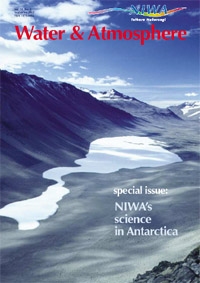
Editorial
Plans are now underway for an “International Polar Year” in 2007/08 to mark the fiftieth anniversary of the International Geophysical Year (IGY) of 1957–58. The IGY launched a global scientific study to understand the world’s environment, particularly in the polar regions. New Zealand’s contribution to the IGY was considerable, with the commissioning of Scott Base, Edmund Hillary’s trek to the South Pole as part of the International Trans-Antarctic Expedition, and the foundation of New Zealand’s national Antarctic science programme, of which NIWA is now a significant participant.
In this special issue of Water & Atmosphere we summarise some of current studies carried out by NIWA and its collaborating partners in Antarctica and the Southern Ocean.
The last few decades have seen a rapid acceleration of our understanding of the critical roles played by Antarctica and the Southern Ocean as drivers of global processes and as indicators of the health of our planet. At the same time, environmental pressures have increased in Antarctica and in the Southern Ocean (e.g., tourism, fishing). New Zealand’s marine work in Antarctica has progressed rapidly over the past few years, with work on coastal ecosystems (“Assessing biodiversity”, “Tangaroa”, “Life in the dark”), advances in studies on sea-ice (“What’s so important about sea ice?”) and important contributions to management of the toothfish fishery (“Fishing in the ice: is it sustainable?”).
Since New Zealand became a signatory to the International Convention on Biodiversity there has been an increased impetus for information on Antarctic marine biodiversity. The Ministry of Fisheries has invested in biodiversity research in the Ross Sea (“Ministry of Fisheries Antarctic research”), including a voyage of NIWA’s research vessel Tangaroa in conjunction with the Italian ship RV Italica in February 2004, which will focus on biodiversity in both deep and shallow waters of the Ross Sea (“Voyage of the Italica”, “Tangaroa”).
The unique inland waters of Antarctica (“Aquatic ecosystems of the McMurdo Dry Valleys”, “Pond life on the McMurdo Ice Shelf”) are ecosystems in which New Zealand scientists have a long history of research and particularly close links with the USA National Science Foundation’s Long Term Ecological Research Programme. With “The Antarctic atmosphere” we introduce New Zealand’s significant contribution to international science on ozone depletion, an area in which our researchers are highly regarded. Together with national and international colleagues NIWA has studied tides in the Ross Sea, and aspects of the oceanography of the Southern Ocean (“Tides in the Ross Sea”, “From icebergs to pongas”). In particular, our sea-ice work work links with that of Industrial Research Ltd (“What’s so important about sea ice?”). Finally, NIWA has undertaken hydrographic surveys of shipping lanes in the northern Ross Sea for New Zealand’s surveying agency, Land Information New Zealand.
The rapid changes in New Zealand’s Antarctic science over the last decade have been successfully driven with funding from the Foundation for Research, Science and Technology (FRST) and the Ministry of Fisheries, and with excellent support from Antarctica New Zealand (“Supporting quality science”) without which little of this work would have been possible. NIWA has also committed significant funding itself to Antarctic research and we look forward to involvement in planning New Zealand’s contribution to the International Polar Year in 2007/08.
Clive Howard-Williams (NIWA General Manager, Freshwater and Education) Neil Andrew (NIWA General Manager, Marine and Aquaculture) (Editors, Water & Atmosphere special issue)
Murray Poulter (NIWA General Manager, Atmosphere) Don Robertson (NIWA General Manager, Biodiversity, Biosecurity and Information Systems) Rob Murdoch (Research Director)
